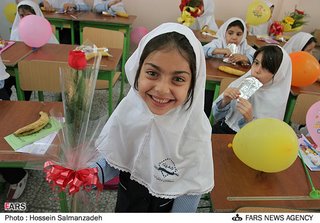Click on the title. After months of debate Majlis passed a law that Iranian women's children of foriegn nationals can apply for citizenship. I think this is a step forward.
Write more later, too busy at work.
Thursday, September 28, 2006
Monday, September 25, 2006
Proxy Talks: Iran - USA

David Ignatius has invited Iranian bloggers to comment on Iran and USA proxy talks, and the signaling games between two countries. The issue has been addressed by several think tanks and the links are on David’s webpage. The reports are most informative about how Iran’s issue has been perceived in Washington DC and at Capitol Hill. Reading them for an Iranian is a great experience of the image that political strategists have in their mind.
We are in the post Iraq occupation, post name-calling, post Lebanon 34 days war. Now the violence in Iraq is escalating. The situation in Afghanistan seems fragile and Pakistan is letting Taliban go and is not happy with Kabul. Lebanon war demonstrated the limits of air strikes. Iran enjoys a sort of high peak in regional influence, suffers from economic problems and needs to secure alternative energy resources to sell more oil to address them.
Reading the reports it seems that no one has any clear idea about how political decisions are made in Iran. Far from being a dictatorship, Iran is a great example of a crude democracy. There are several groups and circles that influence the political decision making process in Iran. These groups oppose or support policies and options they find harmful or profitable. They also use foreign policies issues to make their point in a domestic issue. Their dynamics demands close attention.
Second many forget that Iran and USA have mutual interests. Iran needs a calm neighborhood to flourish economically and to open its borders to the regional trade much needed for its economy. USA desires a safe Iraq and a stabilized Afghanistan and secure flow of oil from region. Iran also does not share anything ideologically with either Taliban or Al-Qaedeh. Both proved to be most dangerous for Iran’s homeland security in the past.
It is a fact that the decision making circles vary in power and influence in Iran, They do not necessarily share the same interests. But they all have one thing in common. Most of them remember Iran-Iraq war clearly and its lessons. Should Iran be cornered again by the whole world, she must be able to defend herself. Surely readers recall that during 8 years of that war Saddam had the blessings of the White House, the funds of Arab leaders and the largest network of arms suppliers, Iran had to do with domestic products, engineers’ ingenuity and black market.
USA must appreciate those concerns dealing with Iran and address them with sincere guarantees and mutual respect. Yelling like a cop just prevents the other side from stopping and talking. Nobody is making an arrest here.
Although many believe in the “let’s shoot and then shoot some more and then shoot even some more” it is certain a military strike will fail to stop Iran. Any such folly would encourage more radicalism in Iran and would not achieve the psychological effect that makes such an idea appealing to neo cons. Thus this is the situation: Iran and USA are locked in a situation that neither can eliminate the other player and both need each other.
It is regrettable that administration turned down Iran’s 2003 offer, made by then President Khatami, however a grand bargain is not off the table. Iran could use its influence in Iraq and contribute greatly to stability in Afghanistan. Its 75 million strong population and their entrepreneurship abilities could transform this country’s economy to the engine of economic growth for Iraq, Iran and Afghanistan. And thus they would deny terrorism the fertile ground of poverty and frustration. It is the greatest lesson of development in Africa that foreign aids do not build a national economy, regional trade does.
In return USA could face the hard days in Iraq with more confidence, could be sure that even if Pakistan closes its eyes on revival of Taliban Iran would keep fighting them and guarantee the security of Afghanistan western provinces. It also can be sure that Iran would become a potential ally to harness China’s economy and to challenge Russian influence in Central Asia. Iran would prove instrumental in securing peace in Southern Lebanon and this would force Syria into accepting a compromise.
So yes I believe the proxy talks have a chance and I do think it is time that Secretary Rice to engage in direct talk with Iran. Anything less would imply the absence of sincerity and lack of resolution for a peaceful outcome. USA has already left too much to others. If this is needed to be done then somebody need to do it. Let’s not forget how well Nixon aced in his foreign policy with China. Iran could be a similar success if diplomacy is given a serious chance.
We are in the post Iraq occupation, post name-calling, post Lebanon 34 days war. Now the violence in Iraq is escalating. The situation in Afghanistan seems fragile and Pakistan is letting Taliban go and is not happy with Kabul. Lebanon war demonstrated the limits of air strikes. Iran enjoys a sort of high peak in regional influence, suffers from economic problems and needs to secure alternative energy resources to sell more oil to address them.
Reading the reports it seems that no one has any clear idea about how political decisions are made in Iran. Far from being a dictatorship, Iran is a great example of a crude democracy. There are several groups and circles that influence the political decision making process in Iran. These groups oppose or support policies and options they find harmful or profitable. They also use foreign policies issues to make their point in a domestic issue. Their dynamics demands close attention.
Second many forget that Iran and USA have mutual interests. Iran needs a calm neighborhood to flourish economically and to open its borders to the regional trade much needed for its economy. USA desires a safe Iraq and a stabilized Afghanistan and secure flow of oil from region. Iran also does not share anything ideologically with either Taliban or Al-Qaedeh. Both proved to be most dangerous for Iran’s homeland security in the past.
It is a fact that the decision making circles vary in power and influence in Iran, They do not necessarily share the same interests. But they all have one thing in common. Most of them remember Iran-Iraq war clearly and its lessons. Should Iran be cornered again by the whole world, she must be able to defend herself. Surely readers recall that during 8 years of that war Saddam had the blessings of the White House, the funds of Arab leaders and the largest network of arms suppliers, Iran had to do with domestic products, engineers’ ingenuity and black market.
USA must appreciate those concerns dealing with Iran and address them with sincere guarantees and mutual respect. Yelling like a cop just prevents the other side from stopping and talking. Nobody is making an arrest here.
Although many believe in the “let’s shoot and then shoot some more and then shoot even some more” it is certain a military strike will fail to stop Iran. Any such folly would encourage more radicalism in Iran and would not achieve the psychological effect that makes such an idea appealing to neo cons. Thus this is the situation: Iran and USA are locked in a situation that neither can eliminate the other player and both need each other.
It is regrettable that administration turned down Iran’s 2003 offer, made by then President Khatami, however a grand bargain is not off the table. Iran could use its influence in Iraq and contribute greatly to stability in Afghanistan. Its 75 million strong population and their entrepreneurship abilities could transform this country’s economy to the engine of economic growth for Iraq, Iran and Afghanistan. And thus they would deny terrorism the fertile ground of poverty and frustration. It is the greatest lesson of development in Africa that foreign aids do not build a national economy, regional trade does.
In return USA could face the hard days in Iraq with more confidence, could be sure that even if Pakistan closes its eyes on revival of Taliban Iran would keep fighting them and guarantee the security of Afghanistan western provinces. It also can be sure that Iran would become a potential ally to harness China’s economy and to challenge Russian influence in Central Asia. Iran would prove instrumental in securing peace in Southern Lebanon and this would force Syria into accepting a compromise.
So yes I believe the proxy talks have a chance and I do think it is time that Secretary Rice to engage in direct talk with Iran. Anything less would imply the absence of sincerity and lack of resolution for a peaceful outcome. USA has already left too much to others. If this is needed to be done then somebody need to do it. Let’s not forget how well Nixon aced in his foreign policy with China. Iran could be a similar success if diplomacy is given a serious chance.
Thursday, September 21, 2006
The First Day of the First Grade & The War
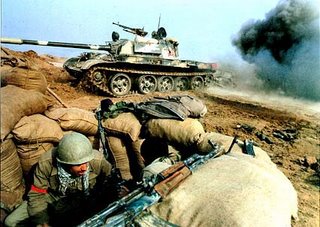
In the life of a child there are times she learns about sounds, he opens his eyes and discovers a new world to start a new era. None of these occasions is as important as the first day of the first grade for many. It is a day that many depart from home to discover classrooms, to meet friends, to learn to write to read and to become part of another society: school.
There are many sounds one learns on this day; screams, school’s principle voice, teacher’s voice, the sound of hundred students talking to each other, the sound of children playing soccer and ….
It was 26 years ago and I was one of those faces with wondering eyes looking at my new treasure; a light brown bag of some leather like substance, pens, pencils, crayons, notebooks and books. Across Iran that day thousands were rejoicing and wondering around theses items as they were jewels of ancient kings, thinking of the day they would become pupils. The sound we discovered that day was unlike any we had expected.
“Alert, Alert, This the Red Alert for Aerial Attack go to the Shelters, seek shelters.”
“Tavajoh, Tavajoh, Alamati ke hamknoon mishenavid Agir ghermez ya alamat khatar e hamelye havaayi ast, be panahgaah beravid.”
Saddam was invading Iran, dozens of cities were bombarded, and Iraqi army in three task forces crossed the international border. Iran was in a state of chaos, armed forces suspected by revolutionary leaders were disorganized, their officers under arrest, suspicion, or suspension.
But country rallied. Iran was under attack, there isn’t any more persuasive argument than that for Iranians. Air Force retaliated, Army set up defenses around cities and re-organized its divisions, and volunteers filled the ranks of Basij & IRGC. They charged Iraqi positions in frontal attacks unheard of since World War I. For the first time in 150 years Iranians pushed the aggressor out of their territory. They shed blood, tears and sweat to do so.
Saddam announced that it was going to be a quick victory. War lasted for 8 years. It transformed Iranian society and left scores of villages and towns in ruins. Thousands perished defending Iran; their number varies from 300’000 to 1’000’000. Thousands more wounded and maimed. World silently watched Iraq used chemical weapons against Iranian 18-years-old soldiers. Hundreds died, hundreds more were left to suffer for years to come. Many still suffer from their wounds.
War also shaped Iran’s psychic and emphasized the fact that no one in the world cares about the fate of an Iranian individual; civilian or military. No one opposed Saddam’s aggression; no Arab leader condemned his use of chemical weapons. In fact many helped him. That fall a smiling King Hussein of Jordan fired a canon toward Iran. Egyptian pilots flied for Iraqi Air Force.
There are many sounds one learns on this day; screams, school’s principle voice, teacher’s voice, the sound of hundred students talking to each other, the sound of children playing soccer and ….
It was 26 years ago and I was one of those faces with wondering eyes looking at my new treasure; a light brown bag of some leather like substance, pens, pencils, crayons, notebooks and books. Across Iran that day thousands were rejoicing and wondering around theses items as they were jewels of ancient kings, thinking of the day they would become pupils. The sound we discovered that day was unlike any we had expected.
“Alert, Alert, This the Red Alert for Aerial Attack go to the Shelters, seek shelters.”
“Tavajoh, Tavajoh, Alamati ke hamknoon mishenavid Agir ghermez ya alamat khatar e hamelye havaayi ast, be panahgaah beravid.”
Saddam was invading Iran, dozens of cities were bombarded, and Iraqi army in three task forces crossed the international border. Iran was in a state of chaos, armed forces suspected by revolutionary leaders were disorganized, their officers under arrest, suspicion, or suspension.
But country rallied. Iran was under attack, there isn’t any more persuasive argument than that for Iranians. Air Force retaliated, Army set up defenses around cities and re-organized its divisions, and volunteers filled the ranks of Basij & IRGC. They charged Iraqi positions in frontal attacks unheard of since World War I. For the first time in 150 years Iranians pushed the aggressor out of their territory. They shed blood, tears and sweat to do so.
Saddam announced that it was going to be a quick victory. War lasted for 8 years. It transformed Iranian society and left scores of villages and towns in ruins. Thousands perished defending Iran; their number varies from 300’000 to 1’000’000. Thousands more wounded and maimed. World silently watched Iraq used chemical weapons against Iranian 18-years-old soldiers. Hundreds died, hundreds more were left to suffer for years to come. Many still suffer from their wounds.
War also shaped Iran’s psychic and emphasized the fact that no one in the world cares about the fate of an Iranian individual; civilian or military. No one opposed Saddam’s aggression; no Arab leader condemned his use of chemical weapons. In fact many helped him. That fall a smiling King Hussein of Jordan fired a canon toward Iran. Egyptian pilots flied for Iraqi Air Force.
Iranians found themselves to be alone and isolated, in a way that a tyrant was actually allowed to commit any crimes against them without fear of international punishment or opposition. They still remember that lesson.
The war also changed the Middle East forever; Saddam used his military machine against Kuwait, a former ally, and created such a threat that was to be faced by the largest international coalition since the Second World War. Today Iraq is in danger of civil war as a consequence of that act of aggression in 1980. For Iraqis war never ended since that day.
We first graders of 1980 did not know that day, but the world outside our homes changed forever and so did our homes and families. Some lost a father or a brother. 8 years later war was all we knew, its noises too familiar. Peace had became a forgotten dream. Today I hope and pray no other first grader anywhere in the world has ever to discover the sound of this beast, the first day he or she explores the world outside. Today I pray for the souls of those who died and for the sufferings of those who survived. Today let's remember them.
The war also changed the Middle East forever; Saddam used his military machine against Kuwait, a former ally, and created such a threat that was to be faced by the largest international coalition since the Second World War. Today Iraq is in danger of civil war as a consequence of that act of aggression in 1980. For Iraqis war never ended since that day.
We first graders of 1980 did not know that day, but the world outside our homes changed forever and so did our homes and families. Some lost a father or a brother. 8 years later war was all we knew, its noises too familiar. Peace had became a forgotten dream. Today I hope and pray no other first grader anywhere in the world has ever to discover the sound of this beast, the first day he or she explores the world outside. Today I pray for the souls of those who died and for the sufferings of those who survived. Today let's remember them.
BestBuy and New Competition

According to NY Times Flat-Panel TV sales have helped the company during its second quarter. The robust demand for Flat-Panel TV is considered to be “the engine of growth” for this company. Today Wall Street Journal has reported the prospects of Flat-Panel TV profitability are not as bright as before anymore, since Home Depot has started to offer the item in its stores.
From an industrial organization point of view, this is very interesting. The concept of entering market is usually taught as a new business entering into market, so the number of firms increases. However entering market apparently is a wider concept and it includes offering new services and products by existing firms as well. Still one can argue the number of suppliers of that product increases without a change in total number of firms present in the market.
Regarding Flat-Panel TV the number of stores increases, however there is no new business in the market. What would happen to follow up technical services and warranty? Would the existing companies keep offering them? Or there would be new entry into the market?
The increasing competition among Flat-Panel TV suppliers promise a declining price, however declining price could mean decline in the marginal gains of warranty services so I wonder if a Flat-Panel TV still comes with a great technical support.
Tuesday, September 19, 2006
Iranian Surprise
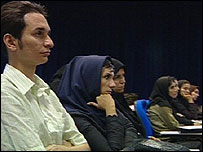
It is interesting to compare pre-revolution days to post-revolution ones. Many westerns consider pre-revolution a time of freedom for women. However it must be noticed that their participation in Iranian universities never matched that of men in those days. It is ironic to notice that how much the number of Iranian female students and their presence in academic circles have increased during last years.
The causes of this drastic difference are many and I won't be surprised if one discovers after revolution many traditional families feel that they can send their daughters to universities without being worried about influence of a strange culture.
The lesson is that at the end of the day, there are the people who initiate lasting and real changes. The surface of things says little about the reality of events.
A seemingly modern society had defined very traditional roles for women, which even its small elite seemed to follow and to believe in. A seemingly traditional society has defined and accepted very progressive roles for women in several places such as universities and work places. That is the surprise of Iran and Islamic Republic of Iran.
The causes of this drastic difference are many and I won't be surprised if one discovers after revolution many traditional families feel that they can send their daughters to universities without being worried about influence of a strange culture.
The lesson is that at the end of the day, there are the people who initiate lasting and real changes. The surface of things says little about the reality of events.
A seemingly modern society had defined very traditional roles for women, which even its small elite seemed to follow and to believe in. A seemingly traditional society has defined and accepted very progressive roles for women in several places such as universities and work places. That is the surprise of Iran and Islamic Republic of Iran.
Fars Agency Photos from Venezuela
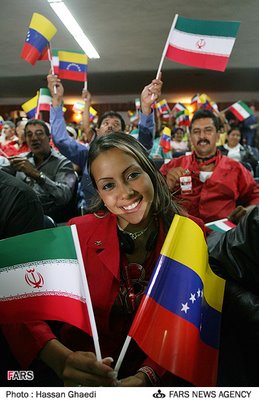
President Ahmadinegad's visit to Venezuela. For other photos click on the label. These photos are from FARS News Agency, one of Iran's 4 official news agency, who supposedly has conservative interests.
President Ahmadinegad called Venezuela "Iran's strategic partner." Both President Chavez and he emphasized that their alliance is NOT anti-American.
Monday, September 18, 2006
Sunday, September 17, 2006
Documentaries on Economy
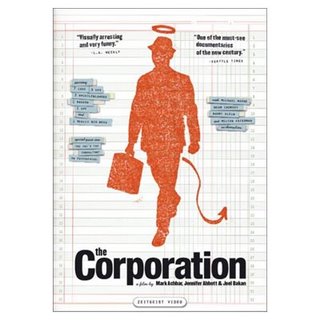
The debate over social security, the collapse of Enron, the rising cost of living, the mounting feelings of insecurity and the shift in American life style have encouraged a new series of documentaries about economy. Among them, one can mention: Wal-Mart: The High Cost of Low Price, The Corporation and Enron: The Smartest Guy in The Room.
Most of these movies are produced by people whom one consider leftist or liberal minded. And they approached their subjects with such motivations. Both “The Corporation” and “Enron..” are attacking the profit seeking behavior of executives and corporations. Such a motive is very natural from an economist’s point of view. To imagine that a corporation wants to maximize people welfare is neither realistic nor pragmatic.
“Wal-Mart…” also approaches its agenda emotionally. It portrays destroyed communities and destructed businesses as well as hungry workers. It covers the incentives that Wal-Mart receives to open a new business, however it does not address the causes of such events. The movie does not pay attention to correlation between Wal-Mart and other businesses or the political motives of local governments to grant such incentives.
Make no mistake I do not deny the negative externalities of Wal-Mart activities or the tragic consequences of Enron collapse. They do exist and they should be prevented if we desire a healthy social order. However to address such issues emotions must motivate thorough investigation to identify the causes and legal black holes.
It is interesting to notice that all these movies ignore to address the information distribution, and how vast resources of corporations allow them to skew information distribution in the market in their own favor. All movies are silent about legal mechanism that allowed Enron executives to deceive shareholders and employees to the last minute.
There will be more questions and the increase in individuals’ dependence on their own resources for every aspect of their lives: from health insurance to retirement pension will motivate individuals to ask questions. There will be more tragic events if the causes and the mechanism of past ones go unnoticed and remain unanalyzed.
Most of these movies are produced by people whom one consider leftist or liberal minded. And they approached their subjects with such motivations. Both “The Corporation” and “Enron..” are attacking the profit seeking behavior of executives and corporations. Such a motive is very natural from an economist’s point of view. To imagine that a corporation wants to maximize people welfare is neither realistic nor pragmatic.
“Wal-Mart…” also approaches its agenda emotionally. It portrays destroyed communities and destructed businesses as well as hungry workers. It covers the incentives that Wal-Mart receives to open a new business, however it does not address the causes of such events. The movie does not pay attention to correlation between Wal-Mart and other businesses or the political motives of local governments to grant such incentives.
Make no mistake I do not deny the negative externalities of Wal-Mart activities or the tragic consequences of Enron collapse. They do exist and they should be prevented if we desire a healthy social order. However to address such issues emotions must motivate thorough investigation to identify the causes and legal black holes.
It is interesting to notice that all these movies ignore to address the information distribution, and how vast resources of corporations allow them to skew information distribution in the market in their own favor. All movies are silent about legal mechanism that allowed Enron executives to deceive shareholders and employees to the last minute.
There will be more questions and the increase in individuals’ dependence on their own resources for every aspect of their lives: from health insurance to retirement pension will motivate individuals to ask questions. There will be more tragic events if the causes and the mechanism of past ones go unnoticed and remain unanalyzed.
There is no doubt the lifestyle is changing, small businesses are closing, more than ever big corporations are ready to dominate all aspects of economic life and put an end to free markets where firms could not determine the outcomes. To save the day, one must think and analyze the motives, the events, the market mechanism using economics theories. This has been neglected for too long.
Friday, September 15, 2006
Farewell Oriana
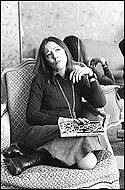
Today I woke up to a fresh breeze of autumn, shining sun, blue sky and the promise of a new day, a better time. Glancing through news there was one headline “Oriana Fallaci passed away age 77”.
What is life? Once somewhere I read: “life is like a plate, you need to fill it very well otherwise it means nothing” The book was Nothing, and so be it by Oriana Fallaci. She filled her own plate with so many different things.
“Nothing and so be it” became the way many of my generation, young Iranians growing up in time of war with Iraq, see Vietnam conflict. I read her other works; her interviews and her other novel If Sun Dies. There was something eye-catching about her a sense of self righteousness; an audacious approach to subjects.
In her interview with history she asked Shah of Iran why her book was collected from bookstore when Nixon was visiting Tehran. May be she failed to see how her work had become a powerful element in leftist mindset of Iran’s and Middle East intellectual society in 70's. Her aggressive questions[1] and her somehow arrogant writing style endeared her to many, who did not have a way to question their rulers.
…But there was another Fallaci too, a Fallaci who wrote The Force of Reason and The Rage and The Pride. The gifted journalist she was, she took her readers on an emotional journey to portray an Islam unfamiliar to many Muslims. A true traditionalist European she was, she shared with her audience her dismay witnessing the changes in Europe’s demography and the increase in Muslim immigrants population. Her language as colorful as ever portrayed Muslims as people who “multiply like rats”. Many consider this an outright racism. The storm was inevitable, the courts, the articles, the controversy that followed.
No one was more puzzled than her own audience in Islamic world, where she was liked as a courageous journalist and a great writer. For many she became a prophet of decline.
Today Oriana is gone… Today let's not think of her as the author of The Force of Reason but as that courageous reporter who wrote from the trenches of Vietnam, who gave us a glimpse into an unknown world. Many remember her as that woman who ventured the world of powerful ones and asked those questions they did not expect to hear or answer. And As the strong will woman she was.
After all life is about doing the right thing and not about being right. Oriana was an idol from an era when being right was more important than doing the right thing. Then she did the right thing that makes her life remarkable. She was wrong about Islam that is understandable. She was furious about changes in Europe because she was a hardcore European, a great one in the truest sense of the word. That also is understandable.
In one of her last interviews she commented “their reactions show that I am right.”
You were wrong, Oriana, but we still love you, rest in peace.
[1] Henry Kissinger wrote after being interviewed by her that the interview was "the single most disastrous conversation I have ever had with any member of the press".
Thursday, September 14, 2006
Happened in Texas
There are a few articles about University of Texas Arlington students decision to burn Iran and North Korea flags on the anniversary of 9-11. Here are the links:
http://www.freerepublic.com/focus/f-news/1699962/posts
http://www.ledger-enquirer.com/mld/dfw/news/15494283.htm?source=rss&channel=dfw_news
http://www.freerepublic.com/focus/f-news/1699962/posts
http://www.ledger-enquirer.com/mld/dfw/news/15494283.htm?source=rss&channel=dfw_news
Tuesday, September 12, 2006
Interesting Article About New Publications on Iran
Columbia Journalism Review Web site has posted a new article by Bill Berkley regarding
the new publications by the new generations of Iranian-born and Farsi speaking authors.
The article is valuable because of the summary it provides of books and manuscripts by different authors. However one could disagree with Professor Berkley on many points
regarding his evaluation.
To read the article click on the title
the new publications by the new generations of Iranian-born and Farsi speaking authors.
The article is valuable because of the summary it provides of books and manuscripts by different authors. However one could disagree with Professor Berkley on many points
regarding his evaluation.
To read the article click on the title
Sunday, September 10, 2006
An Increase in Automobile Prices in Iran

BBC Persian service has reported an increase in automobile prices in Iran. I have checked the dailies such as Shargh, Sarmayeh and Rooz, I could not find similar reports, so following speculation is challengeable by contradicting evidence
In following an import substitution strategy and to boost national pride Iran has established domestic manufacturing lines to assemble automobile. Iran National Automobile Manufacturing Group known as Iran Khodro is the largest of these companies. There are also other firms such as SAIPA, started as a Renault manufacturer and others. Seeking to establish a self sufficient car manufacturing industry Iranian government banned importing foreign made cars for almost a decade; even now tariffs to import foreign manufactured cars are staggering.
In this monopoly situation purchasing a car became a rather difficult process. Queues were made of customers and the right to purchase a care at factory price became a market commodity as well. Interestingly an active market for used cars was developed as well, however hardly one can notice a depreciation of nominal price for cars during last decades. Although this increasing trend was contributed to the inflation and general increase in price index, one should notice demand for cars in Iran was not and is not purely based on utility maximization behavior.
The very low gas prices in Iran and ingenuity of local mechanics[1] keep the maintenance cost of automobile relatively low. On the other hand the real value of money keeps declining because of ever present inflationary conditions. In the absence of higher than zero real interest rates from banking system, households save in any form of durable products available to them: hard currency, golden coins[2], real estate and cars. One also must mention the increasing role of Stock Exchange Market an increase in household savings in the form of bonds and shares; however that has proved a risky endeavor in the long run[3].
It could be argued that Iranian household has learned to diversify its saving portfolio in order to reduce its risk. It also could be argued that demand for cars also is determined by the risk factor.
According to BBC the price of Samand a domestic product has increased from 10’800’000 Tomans[4] to 11’800’000, Price of Peugeot Pars from 16’900’000 to 17’800’000 Tomans. The increase in the case of Peugeot 206 is 400’000 Tomans for its different types. The price of Pride, the most popular car in country, has increased from 6’850’000 Tomans to 7’150’000 Tomans. These show an increase of 4% to almost 10% for the price of different makes and models in market.
Some speculate that the increase in automobile prices is initiated by decrease in the quantity supplied, which is because of lack of parts and Iran Khodro exports. However if the increase is universal for all models and makes, one might conclude that the increase in automobile prices could be caused by a shift in the demand.
It is certain now that government would not implement rationing of car gases to reduce the fuel imports. Thus might demand has increased because of cost of maintenance has remained low. However I would like to argue that the gas price would not be lower than before and the contribution of this policy to increase in demand should not be exaggerated.
The question is that if market demand for cars has increased because of decrease in rate of returns of stocks and an increase in the risk factors? A few months ago there was an increase in the price of gold in the market, which was controlled by increase in the supply of gold by the Central Bank of Iran. Could this be the second wave of increase of demand to save in the form of durable products excited by an increased risk factor and public expectation of a higher inflation rate?
Coming months would answer that.
[1] They actually fix the parts instead of ordering a substitute, thus one pays for labor and not the part.
[2] Traditionally Iranians are fond of golden coins and up to day it is a measurement of value, a memorable gift and a way of saving. As a gift it is more of a gift card whose real purchasing power
[3] The reaction of Tehran Stock Exchange to the last year presidential election results in major losses by middle class shareholders.
[4] Currently 1 USD is 920 Tomans in Tehran’s Bazaar, however one might argue that an exchange rate based on Purchasing Power Parity should be implemented. Thus I keep the prices at local level.
In following an import substitution strategy and to boost national pride Iran has established domestic manufacturing lines to assemble automobile. Iran National Automobile Manufacturing Group known as Iran Khodro is the largest of these companies. There are also other firms such as SAIPA, started as a Renault manufacturer and others. Seeking to establish a self sufficient car manufacturing industry Iranian government banned importing foreign made cars for almost a decade; even now tariffs to import foreign manufactured cars are staggering.
In this monopoly situation purchasing a car became a rather difficult process. Queues were made of customers and the right to purchase a care at factory price became a market commodity as well. Interestingly an active market for used cars was developed as well, however hardly one can notice a depreciation of nominal price for cars during last decades. Although this increasing trend was contributed to the inflation and general increase in price index, one should notice demand for cars in Iran was not and is not purely based on utility maximization behavior.
The very low gas prices in Iran and ingenuity of local mechanics[1] keep the maintenance cost of automobile relatively low. On the other hand the real value of money keeps declining because of ever present inflationary conditions. In the absence of higher than zero real interest rates from banking system, households save in any form of durable products available to them: hard currency, golden coins[2], real estate and cars. One also must mention the increasing role of Stock Exchange Market an increase in household savings in the form of bonds and shares; however that has proved a risky endeavor in the long run[3].
It could be argued that Iranian household has learned to diversify its saving portfolio in order to reduce its risk. It also could be argued that demand for cars also is determined by the risk factor.
According to BBC the price of Samand a domestic product has increased from 10’800’000 Tomans[4] to 11’800’000, Price of Peugeot Pars from 16’900’000 to 17’800’000 Tomans. The increase in the case of Peugeot 206 is 400’000 Tomans for its different types. The price of Pride, the most popular car in country, has increased from 6’850’000 Tomans to 7’150’000 Tomans. These show an increase of 4% to almost 10% for the price of different makes and models in market.
Some speculate that the increase in automobile prices is initiated by decrease in the quantity supplied, which is because of lack of parts and Iran Khodro exports. However if the increase is universal for all models and makes, one might conclude that the increase in automobile prices could be caused by a shift in the demand.
It is certain now that government would not implement rationing of car gases to reduce the fuel imports. Thus might demand has increased because of cost of maintenance has remained low. However I would like to argue that the gas price would not be lower than before and the contribution of this policy to increase in demand should not be exaggerated.
The question is that if market demand for cars has increased because of decrease in rate of returns of stocks and an increase in the risk factors? A few months ago there was an increase in the price of gold in the market, which was controlled by increase in the supply of gold by the Central Bank of Iran. Could this be the second wave of increase of demand to save in the form of durable products excited by an increased risk factor and public expectation of a higher inflation rate?
Coming months would answer that.
[1] They actually fix the parts instead of ordering a substitute, thus one pays for labor and not the part.
[2] Traditionally Iranians are fond of golden coins and up to day it is a measurement of value, a memorable gift and a way of saving. As a gift it is more of a gift card whose real purchasing power
[3] The reaction of Tehran Stock Exchange to the last year presidential election results in major losses by middle class shareholders.
[4] Currently 1 USD is 920 Tomans in Tehran’s Bazaar, however one might argue that an exchange rate based on Purchasing Power Parity should be implemented. Thus I keep the prices at local level.
Saturday, September 09, 2006
Khatami Under Fire from Both Sides
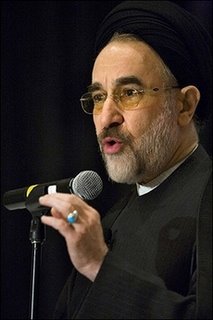
Former president of Iran who is now the symbol of a failed reform movement arrived in the United States. His arrival sparked a new row of political bickering within both countries. In Iran radicals and ultra radicals condemned the trip in the strongest terms. Fatemeh Rajabi, whose spouse Mr. Elham is government’s spokesman wrote that this trip is an award to Khatami’s American policies, who has become a servant of White House. She demanded him to be defrocked. Her comments were responded by several reformers, conservatives and even radical daily Kayhan.
In the United States many neo conservatives took upon themselves to criticized State Department, to attack Mr.Khatami and even some compared him with Goebbels Nazi propaganda minister. Governor of Massachusetts openly announced that he would deny him state protection during his visit to Harvard. Many warned the public of not paying attention to Mr. Khatami’s propaganda.
Interestingly Mr. Khatami remained the icon of moderation during his visit. He asked for the United States to preserve its presence in Iraq until peace is restored. Repeated Iran’s position that a Two States solution is acceptable and If Palestinians make peace so would Iran. He asked American Muslims to be exemplary citizens and try to climb up the ladder of education and social progress. He condemned the terrorist attacks of 9-11 in the most severe terms, which USA could not expect form its so called allied Arab leaders to do. He condemned terrorism saying:
In the United States many neo conservatives took upon themselves to criticized State Department, to attack Mr.Khatami and even some compared him with Goebbels Nazi propaganda minister. Governor of Massachusetts openly announced that he would deny him state protection during his visit to Harvard. Many warned the public of not paying attention to Mr. Khatami’s propaganda.
Interestingly Mr. Khatami remained the icon of moderation during his visit. He asked for the United States to preserve its presence in Iraq until peace is restored. Repeated Iran’s position that a Two States solution is acceptable and If Palestinians make peace so would Iran. He asked American Muslims to be exemplary citizens and try to climb up the ladder of education and social progress. He condemned the terrorist attacks of 9-11 in the most severe terms, which USA could not expect form its so called allied Arab leaders to do. He condemned terrorism saying:
“We, Muslims, should condemn this atrocity even more strongly. Terrorism, which means killing civilians in whatever name or title, lacks morality, and nobody who lacks such principle will go to heaven. Those who kill others and commit acts of terror, if they identify themselves with Islam, they are lying."
It must be noticed that moderates in both Iran and USA welcome these comments; while radicals and neo-cons condemned them. After all it seems Iran’s radicals are in agreement with their American counterparts.
One can’t help ask: Isn’t this the message America wants to transmit to millions of middle easterns?
And if it is then why American foreign policy and some American politicians are after silencing moderate forces such Mr. Khatami, who might not be a great success but is telling a forgotten truth.
Tuesday, September 05, 2006
Economics & Caribbean Pirates Rules

I admit that I was not a big fan of Johnny Depp until the first part of Caribbean Pirates. Among so many remarkable lines of this movie one what I like most as an economist is this:
“The only rules that really matter are these: what a man can do and what a man can't do. For instance, you can accept that your father was a pirate and a good man or you can't. But pirate is in your blood, boy, so you'll have to square with that some day. And me, for example, I can let you drown, but I can't bring this ship into Tortuga all by me onesies, savvy? So, can you sail under the command of a pirate, or can you not?”
Economics has so many different notions for “what a man can do and what a man can’t do” Production Possibility Frontier, Budget Line, Production Function, Iso Costs and etc. showing Mr and Mrs Customer's resources or market prices what they can do and what they can't do.
Their decisions are based on both what-they-can-do and what-they-can't-do. And What-they- can't-do ones constitute their opportunity cost.
In its very nature these are the only rules that really matter, because economics tries to find a solution to our unbounded demands given or limited resources. So we all can reach Tortuga.
Sunday, September 03, 2006
Diminishing Marginal Returns in History

Those who study or teach economics are familiar with the concept of diminishing marginal returns. It is a simple concept, when you are investing in an enterprise the contribution of your dollars to production starts to decline after a certain point. An extra dollar contribution to production is less than the last dollar you have already spent. Surprisingly it seems this concept also applies to implementing force.
History is full of such examples, when large forces failed while small ones succeeded. When Napoleon invaded Russia with 600’000 soldiers many thought the large number of his army guaranteed the victorious result. The history recorded the outcome differently.
The reality is that the amount of force a government applies does not influence the outcome completely. It does so partially or at best with decreasing rate of return. There are several other factors.
Although the technological advances have made military machines magnificent and the armaments most lethal, it seems that these also have their limits and their point of declining marginal returns.
The Economist recent article on air power could be read with this microeconomic concept in mind.
Saturday, September 02, 2006
A Tragedy and Revisiting A Policy
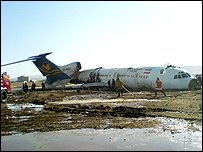
Another tragedy in Iran has happened; yesterday ISNA reported that a TU 154 M caught fire after hitting a stair in Mashhad International Airport at north east of Iran. From its 148 passengers 29 were killed and 43 are injured according to the reports. This has been the 10th lethal accident in Iran aviation since 2000 and the fifth crash of a Russian aircraft operating civilian routes in Iran.
Because of US imposed sanctions Iran cannot acquire parts for its aging fleet of Boeings, including B 707, B 727, B 737 and B 747 operated most by Iran Air and Aseman two public airlines in Iran. The sanctions also discourage any Iranian private airline from acquiring western built aircrafts. The only aircrafts available to Iranians are Russian built Tupolovs, Antonovs and YAKs as well as second hand aircrafts offered by other airlines, such as Turkish Airline. These have already flied thousands of flight hours and their original owners are eager to sell them to acquire new top of the line aircrafts. Under these circumstances Russian aircrafts are attractive because of their availability and technical supports provided by Russian manufacturers and providers. This has mixed consequences for Iran’s domestic commercial aviation industry, which has seen many changes in the last decade.
During 1990’s Iran aviation industry began a fundamental change. During 1980’s it was dominated by government and constitutionally, according to Article 44, it was a government’s monopoly. However the expansion of free zones of Kish and Qeshm islands and an increase in the local demand for air services at provinces far from Tehran encouraged many semi public organizations to start airlines of their own. This resulted in a surge of the number of airlines in Iran. Although mostly owned by the official and public sector organizations or semi public ones these new airlines began their operations to produce profits. Subsidizing two officially public airlines, Aseman and Iran Air, heavily Iran Civil Aviation Administration treated these second cousins as strangers and unwelcome rivals. Most recently truly private airlines became operational whose relations with public sector are that of a regulator and a private company and not that of an owner and its property.
During these years Iran also carried an ambitious program to construct new airports in several cities and provincial centers across the country. In designing new facilities the local population’s demand and the profitability of aviation operations played little role. Public sector built some very fine airports capable of handling large wingspan aircraft in some small cities and provincial centers. This boosted country’s infrastructure to a new level and made the potentials ahead of private aviation far more promising than before. However private airlines lack the aircraft suitable for these local markets and operating at these airports mostly are not profitable.
Meanwhile Iran’s domestic customers welcome the new Russian additions by mixed feelings. On one hand the expanded fleet and competition kept airfares relatively low, in most cases the increase in prices was forced upon private airlines by government decision to increase the price of aircraft fuel, whose soul provider in Iran is government. On the other hand many miss the comfort of new Boeings nostalgically. The Persian Gulf Countries Airlines also set a very high standard, inaccessible by many in the world. Benefiting from several government subsidies and considered a justifiable expense to attract tourism, most region’s public airlines fly some of the finest aircrafts available in the world market.
During past years Iranian airlines efforts to purchase new aircrafts have been blocked on several occasions because of US imposed sanctions and on some because of lack of financing because of sanctions. To a neutral observer it seems that sanctions targeting Iran’s commercial aviation industry does not take into account several facts. First the nature of Iran’s aviation industry has changed permanently. Its civilian sector has transformed from a dominantly public domain to a private one. Government would soon privatize the last two public airlines in Iran, thus domestic aviation will be a purely private business in coming years.
Second these sanctions do not take into account the growing population of Iran and available infrastructure. With a population of 75 million and a very well placed network of domestic airports Iran domestic aviation industry is the only one in the Middle East region that could be profitable on its own. Unlike Persian Gulf countries domestic traffic supersedes international one in Iran and the number of domestic flights is growing. Thus Iranian airlines would compete at domestic markets with companies who use similar aircrafts. Sanctions hurt their chances in the region but not in the country. Not allowing investments in this market and blocking sale of aircrafts are hurting American businesses more than Iranian ones. By endangering civilian lives the existing sanctions also are hurting American image among Iranians more than anything else.
Thus here we are. United States government hoping to press Iranian government into compromise has put in place sanctions against an industry that is not a primary concern of Iranian government. In doing so it has endangered Iranian civilians’ lives and has denied itself a 75 million strong market. Iranians may nag about Russian aircrafts but no one has any doubt that lack of alternative aircrafts is because of Washington DC reluctance to accept uselessness of this policy rather than Iran’s unwillingness to allow its private entrepreneurs to operate them. One wonders how many more deaths Washington needs to re-think its sanctions; because this one is not even working.
Summary of Aircraft Accidents since 2000 in Iran[1]
Date Aircraft Casualty
September 2006 TU-154 M / Russian -29 killed
December 2005 Falcon Jet /French -12 killed
December 2005 C 130 /American -106 killed
April 2005 B 707 /American -2 killed
November 2004 Fokker 50 / Dutch -50 killed
February 2003 Ilyushin/ Russian -276 killed
December 2002 Antonov /Russian -46 killed
February 2002 TU 154-M/Russian -119 killed
May 2001 YAK 40 -29 killed
February 2000 Air Crash -6 killed
[1] From ISNA (Iran Students News Agency)
Subscribe to:
Comments (Atom)
